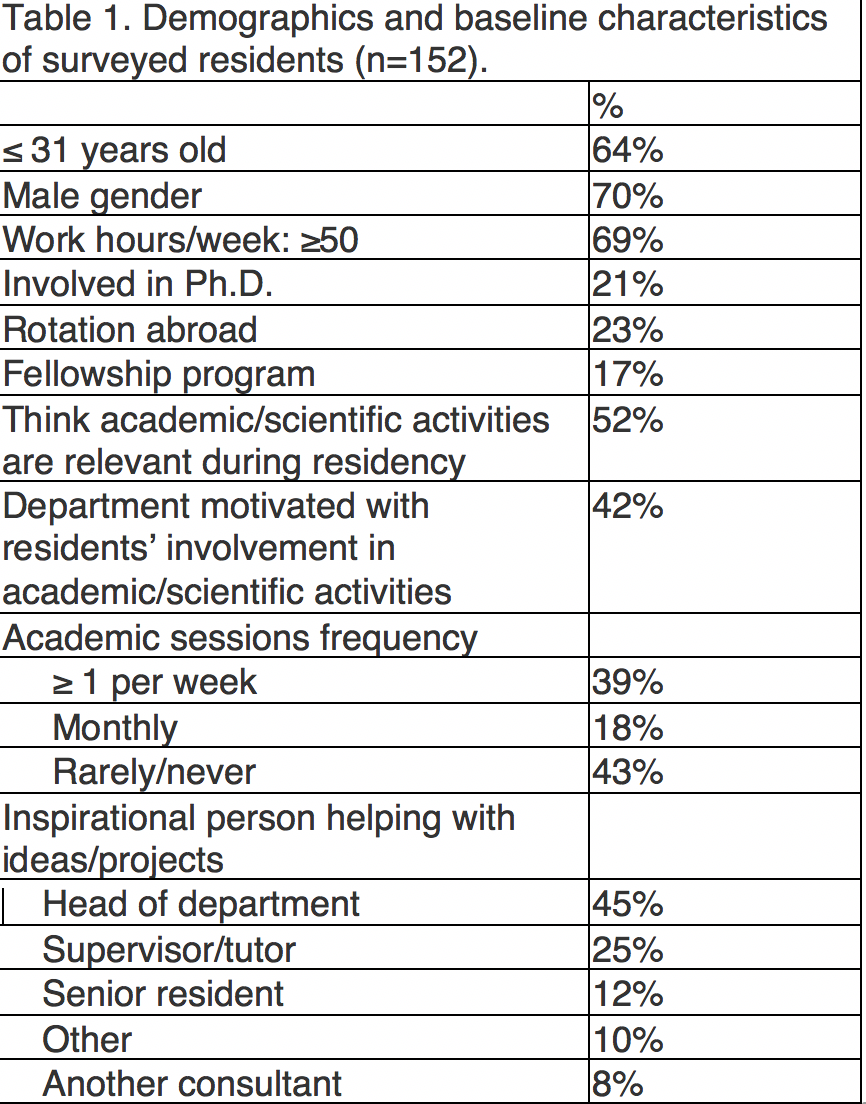As the authors are intimately involved with the European Society of Residents in Urology (ESRU), they built a 38-item online survey that was distributed across the participants of the 2017 European Urologist Residents Education Programme (EUREP) – which is an annual educational event held for urologic trainees throughout the European Union. The survey assessed demographics, workload, involvement in Ph.D. programs, fellowships and rotations abroad, number of published articles in indexed journals as first and as co-author, number of abstracts presented at national/international meetings/congresses as first or as co-author, book chapters published (any author), and total of articles published by department in the last year.
They also assessed the resident’s personal motivation to participate in academic/scientific activities during residency and departments’ motivation effect on residents in such activities using a Likert-5 point scale (1:not relevant/motivated, 2:minimally relevant/motivated, 3:neutral, 4:relevant/motivated and 5:very relevant/motivated).
A total of 152 responders completed the survey, which correlated to a response rate of 43.4%. Complete demographics are depicted in table 1 below:

Most were under age 31 and male. The Head of department and mentors within the department were the predominant drivers of academic pursuits.
They did not break down by country, but the author noted the respondents were primarily from southern European countries.
The breakdown of academic activity is below:

Some of the take-home points:
-48% of respondents think academic, scientific and research activities are not relevant during residency.
-58% felt that motivation from their department to get involved in research was lacking
In looking at items that were associated with publishing more articles as first author were: being involved in a Ph.D., rotation abroad, and motivation/support from the department. Publishing more articles as co-author was only associated with department motivation/support. Publishing more book chapters was associated with doing a fellowship and a rotation abroad. Presenting more abstracts at national/international congresses/meetings as first author and as co-author was associated with doing a rotation abroad and with department motivation.
While the authors conclude that there is a “worrisome lack of interest of residents and lack of motivation of departments regarding academic and scientific activities,” I feel this is a little strong. As in the United States, most graduating trainees are not destined for academic practice – and pursuing academic projects may not be necessary for those trainees (and may lead to disinterent, burnout, etc). However, important take-home points are that mentorship is a strong driver of interest and publishing. This can come in the form of departmental support OR individual mentors.
Mentorship can be severely lacking within a single department, and sometimes it is important to look beyond one’s department and institution for good mentorship!
Presented by: Diego M. Carrion, Urology Resident at La Paz University Hospital, Madrid.
Co-Authors: Rodriguez Socarras M., Mantica G., Esperto F., Cebulla A., Vasquez J.L., Palou J, Gomez Rivas J.
Written by: Thenappan Chandrasekar, MD, Clinical Instructor, Thomas Jefferson University) (twitter: @tchandra_uromd, @JEFFUrology, at the 34th European Association of Urology (EAU 2019) #EAU19 conference in Barcelona, Spain, March 15-19, 2019.


